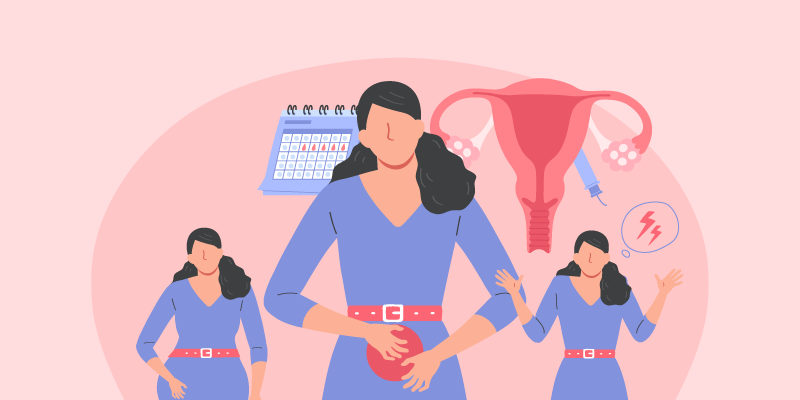Everything you need to know about irregular periods and pregnancy

Author: Dr. Sai Manasa Darla, Consultant, Fertility Specialist & Laparoscopic Surgeon
Pregnancy is a roller coaster journey and it can be overwhelming when you face difficulty in conceiving.
Tracking a woman’s period is the first step of this journey. It is essential to know the length of one’s menstrual cycle, fertile window, and ovulation to plan a pregnancy. Irregularities in the menstrual cycle may cause hurdles in achieving a pregnancy.
What are irregular periods?
A woman’s menstrual cycle varies in length normally. A ‘normal’ menstrual cycle of a woman is anywhere between 21 to 35 days with 2-3 days variation from cycle to cycle.
Periods are considered irregular in the presence of the following conditions:
1.Any cycle that falls beyond or below the ‘normal’ range.
2.Missed periods for longer than 8 days (Could be pregnancy in a few cases).
3.Polyme norrhea: Also referred to as frequent or early periods. It is a menstrual disorder wherein the length of a menstrual cycle is frequently less than 21 days.
4.Oligomenorrhea: A menstrual condition characterized by infrequent periods. The length of a menstrual cycle in such cases is more than 35 days.
Causes of Irregular periods
Several factors lead to erratic periods:
1.Ovulation issues: The chance of conceiving depends on the release of a mature egg or ovulation during a menstrual cycle. Irregular ovulation or anovulation (absence of ovulation) causes irregularities in periods.
2.Polycystic ovary syndrome (PCOS): It is a hormonal disorder wherein the body produces large amounts of male sex hormones (androgens) that leads to irregular ovulation, cysts in the ovaries, and infertility.
3.Thyroid disease: An underactive or overactive thyroid impacts the frequency and regularity of menstrual cycles.
4.Weight gain or loss
5.Stress and anxiety
6.Hormonal Imbalances
7.Irregular usage of birth control pills
8.Conditions like Fibroids, Endometriosis, and Diabetes
9.Sexually transmitted infections
How to plan a pregnancy with irregular periods?
It might seem that a woman can’t get pregnant with irregular periods. But, there is no need to be alarmed, it is possible to get pregnant for a woman with irregular periods provided the issue of irregular periods is addressed and treated.
Tracking ovulation and timed intercourse during ovulation increases the chances of conception exponentially. One can look out for ovulation signs to detect ovulation.
Signs of ovulation
1.An increase in cervical mucus – stretchy, clear, and egg-white-like discharge
2.A spike in your basal body temperature
Ovulation predictor kits, ultrasound, and blood tests can be used to determine ovulation.
In case of irregular ovulation or anovulation, the doctor may prescribe treatment options depending on the root cause. Treating the underlying condition increases your chances of pregnancy.
A few lifestyle changes can go a long way in regulating periods and ovulation.
See a doctor in case of:
1.Absence of periods for more than three months
2.Menstrual bleeding that lasts for more than a week
3.Heavy bleeding
4.Painful periods
5.If you are younger than 35 and failed to conceive for more than a year
Bottom line:
Although irregular periods can be concerning in the pregnancy journey there is no need to be disheartened. By taking timely action and addressing the underlying cause one can have a chance at having a healthy pregnancy.
Inconsistent periods, ovulation issues, and hormonal imbalances that cause irregularities in the menstrual cycle make it harder to get pregnant.
Consulting a fertility specialist can help in improving your fertility by treating the conditions responsible for abnormal menstrual cycle and by regulating and determining ovulation.










